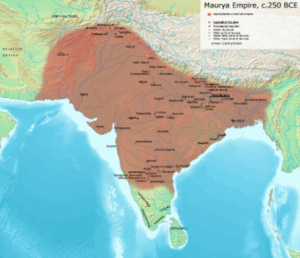If you scoured the Internet looking for the names of great leaders you could get lists that include Abraham Lincoln, Alexander the Great, Winston Churchill, Julius Ceasar and Napolean.
If you narrowed your search to great “great ethical leaders” you would get names such as Ghandi, Martin Luther King, and Mother Theresa.
On both lists you would see the names of Abraham Lincoln and Ashoka the Great. Who was Ashoka the Great you might ask?
Before I tell you, we should say what we mean by “great ethical leadership.”
Great ethical leaders are those remembered not just for power or success, but for moral courage, principled decision-making, and a deep commitment to the well-being of others – even in the face of personal or political risk. We seem to have a shortage of ethical leadership in this country today.


Ashoka the Great reigned from 268-232 BCE. He was no slouch as a warrior, establishing the Maurya Empire in India.
He built a remarkable legacy of ethical and moral guidance in the form of pillar edicts – inscriptions carved into stone pillars scatted all over his empire. The topics of some of the edicts are listed below.
- Urges officials to promote righteous living regularly to the people.
- Encourages kindness, truthfulness, and respect for parents and teachers.
- Calls for proper behavior toward friends, relatives, and all living beings.
- Advocates generosity and moral conduct over ceremonies and rituals.
- Orders humane treatment of prisoners.
- Allows prisoners to earn release through good conduct.
- Declares that the king is always accessible to his subjects for justice.
- Promotes swift and fair administration.
In school in this country, you learn about European and North American history and leaders. I understand that focus. For most people in this country that is their heritage and European languages, religions, customs and laws have shaped who we are.
But kids learn almost nothing about the history of the Middle East, Asia and India. Most kids today have never heard of Kublai Khan, Cyrus II of Persia, Nehru and Sun Yat-sen.
Maybe I shouldn’t be surprised. A 2023 study of US adults found that only 47% could identify the three branches of the US federal government. Why try to add the history of Asia and Arabia to this shaky foundation of knowledge?
